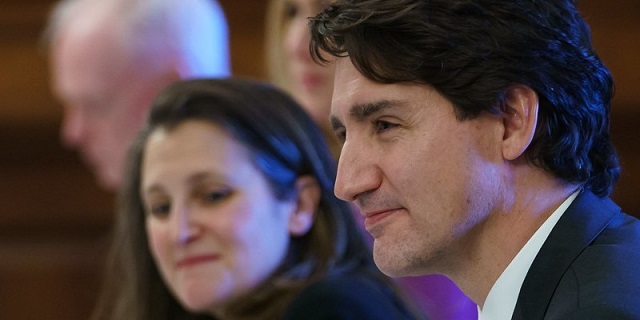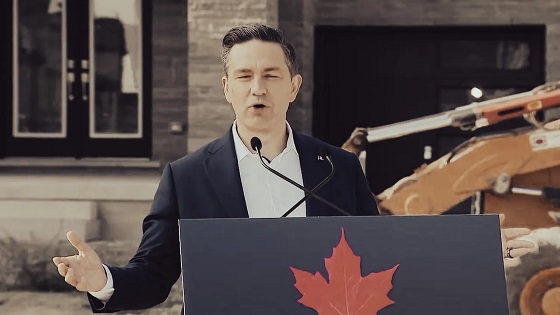Fraser Institute
Federal government should have taken own advice about debt accumulation

From the Fraser Institute
Authors: Grady Munro Jake Fuss
In 2024/25 the federal government now expects to pay $54.1 billion in debt interest, or $1,331 per Canadian, which is $2.0 billion more than it plans to spend on health care transfers to provinces.
In the foreword of the Trudeau government’s recent budget, Finance Minister Chrystia Freeland declared that, “it would be irresponsible and unfair to pass on more debt to the next generations.” Minister Freeland is absolutely right—if only she had listened to her own advice.
Fairness was the purported theme of this federal budget and nearly every new policy is presented as something that will help make life fairer for Canadians—especially younger generations. But the glaring contradiction is that partly due to all of the new spending on these policies, the Trudeau government is doing the very thing it admits is “unfair” and saddling future generations with hundreds of billions in added debt.
By 2027/28, the Trudeau government plans to add $395.6 billion to the total (gross) amount of debt held federally, which is $180.0 billion more than it planned to add just last spring. Overall, gross debt is projected to increase by nearly 20 per cent over the next four years. Adjusting for population growth and inflation during this period, by the end of 2027/28 every Canadian will be responsible for $2,301 more in gross federal debt than they are currently.
Much of this added debt stems from the introduction of new programs, which have caused federal program spending (total spending minus debt interest) over the next four years to be an expected $77.2 billion higher than was forecasted last spring. And though the Trudeau government will increase capital gains taxes to try and pay for this new spending, much of the new spending will still be financed through borrowing. Indeed, combined deficits from 2024/25 to 2027/28 are $44.7 billion higher than forecasted in last year’s budget, and there is no balanced budget in sight at all.
The problem with accumulating substantial amounts of debt, and why Minister Freeland is right when she asserts that it’s “irresponsible and unfair,” is that a growing government debt burden imposes costs on Canadians now and in the future.
One of the most important consequences of government debt are debt interest payments. These interest payments represent taxpayer dollars that don’t go towards any programs or services for Canadians, and have grown to impose a significant burden on federal finances. Specifically, in 2024/25 the federal government now expects to pay $54.1 billion in debt interest, or $1,331 per Canadian, which is $2.0 billion more than it plans to spend on health care transfers to provinces.
While debt interest costs represent a more immediate impact, debt accumulated today must also ultimately be paid for by future generations, again in the form of higher taxes. In fact, research suggests that this effect may be disproportionate, with one dollar borrowed today needing to be paid back by more than one dollar in future taxes.
One study estimates that Canadians aged 16 can expect to pay the equivalent of $29,663 over their lifetime in additional personal income taxes as a consequence of rising federal debt. Older age groups shoulder a much smaller burden in comparison. A 65-year-old can expect to pay $2,433 over their lifetime in additional personal income taxes due to rising federal debt.
The outsized burden of federal debt borne by younger generations of Canadians is hardly what any reasonable person would consider “fair.”
For all its talk about fairness and helping the next generation of Canadians, the Trudeau government’s incessant spending and substantial debt accumulation will simply result in young Canadians paying disproportionately higher taxes in the future. Does that seem fair to you?
Business
Carney government’s housing GST rebate doesn’t go far enough

From the Fraser Institute
While there are many reasons for Canada’s housing affordability crisis, taxes on new homes—including the federal Goods and Services Tax (GST)—remain a major culprit. The Carney government is currently advancing legislation that would rebate GST on some new home purchases, but only for a narrow slice of the market, falling short of what’s needed to improve affordability. A broader GST rebate, extending to more homebuyers and more new homes, would cost Ottawa more, but it would likely deliver better results than the billions the Carney government plans to spend on other housing-related programs.
Today, Ottawa already offers some GST relief for new housing: partial rebates for homes under $450,000, full rebates for small-scale rental units (e.g. condos, townhomes, duplexes) valued under $450,000, and a full rebate for large-scale rental buildings (with no price cap). Rebates can lower costs for homebuyers and encourage more homebuilding. However, at today’s high prices, these rebate programs mean most new homes, and many small-scale rental projects, remain burdened by federal GST.
The Carney government’s new proposal would offer a full GST rebate for new homes—but only for first-time homebuyers purchasing a primary residence at under $1 million (a partial rebate would be available for homes up to $1.5 million). Any tax cut on new housing is welcome, but these criteria are arbitrary and will limit the policy’s impact.
Firstly, by restricting the new GST rebate to first-time buyers, the government ignores how housing markets work. If a retired couple downsizes into a new condo, or a growing family upgrades to a bigger house, they typically free up their previous home for someone else to buy or rent. It doesn’t matter whether the new home is purchased by a first-time buyer—all buyers can benefit when a new home appears on the market.
Secondly, by limiting the GST rebate to primary residences, the government won’t reduce the existing tax burden on rental properties—recall, many small-scale projects still face the full GST burden. Extending the rebate to include rental properties would reduce costs, unlock more construction and expand options for renters.
Thirdly, because the proposed GST rebate only applies in-full to homes under $1 million, it will have little effect in Canada’s most expensive cities. For example, in the first half of 2025, 31.8 per cent of new homes sold in Toronto and 27.4 per cent in Vancouver exceeded $1 million. Taxing these homes discourages homebuilding where it’s most needed.
Altogether, these restrictions mean the Carney proposal would help very few Canadians. According to the Parliamentary Budget Officer, of the 237,324 housing units projected to be completed in 2026—the first full year of the proposed GST rebate program—only 12,903 (5.4 per cent) would qualify for the new rebate. With such limited coverage, the policy is unlikely to spur much new housing or improve affordability.
The proposed GST rebate will cost a projected $390 million per year. However, if the Carney government went further and expanded the rebate to cover all new homes under $1.3 million, it would cost about $2 billion. That’s a big price tag, especially given Ottawa’s strained finances, but it would do much more to improve housing affordability.
Instead, the Carney government plans to spend $3 billion annually on “Build Canada Homes”—a misguided federal entity set to compete with private builders for scarce construction resources. The government has earmarked another $1.5 billion per year to subsidize municipal fees on new housing projects—an approach that merely shift costs from city halls to Ottawa. A broader GST rebate would likely be a more effective, lower-risk alternative to these programs.
Finally, it’s important to note that exempting new homes from GST is not a slam dunk. GST is one of the more efficient ways for the federal government to raise revenue, since it doesn’t discourage work or investment as much as other taxes. GST rebates mean the government may increase more economically harmful taxes to recoup the lost revenue. Still, tax relief is a better way to increase housing affordability than the Carney government’s expensive spending programs. In fact, the government should also reform other federal taxes on housing-related capital gains and rental income to help encourage more homebuilding.
The Carney government’s proposed GST rebate is a step in the right direction, but it’s too narrow to meaningfully boost supply or ease affordability. If Ottawa is prepared to spend billions on questionable programs such as “Build Canada Homes,” it should first consider a more expansive GST rebate on new home purchases, which would likely do more to help Canadian homebuyers.
Business
Upcoming federal budget likely to increase—not reduce—policy uncertainty

From the Fraser Institute
By Tegan Hill and Grady Munro
The government is opening the door to cronyism, favouritism and potentially outright corruption
In the midst of budget consultations, the Carney government hopes its upcoming fall budget will provide “certainty” to investors. While Canada desperately needs to attract more investment, the government’s plan thus far may actually make Canada less attractive to investors.
Canada faces serious economic challenges. In recent years, the economy (measured on an inflation-adjusted per-person basis) has grown at its slowest rate since the Great Depression. And living standards have hardly improved over the last decade.
At the heart of this economic stagnation is a collapse in business investment, which is necessary to equip Canadian workers with the tools and technology to produce more and provide higher quality goods and services. Indeed, from 2014 to 2022, inflation-adjusted business investment (excluding residential construction) per worker in Canada declined (on average) by 2.3 per cent annually. For perspective, business investment per worker increased (on average) by 2.8 per cent annually from 2000 to 2014.
While there are many factors that contribute to this decline, uncertainty around government policy and regulation is certainly one. For example, investors surveyed in both the mining and energy sectors consistently highlight policy and regulatory uncertainty as a key factor that deters investment. And investors indicate that uncertainty on regulations is higher in Canadian provinces than in U.S. states, which can lead to future declines in economic growth and employment. Given this, the Carney government is right to try and provide greater certainty for investors.
But the upcoming federal budget will likely do the exact opposite.
According to Liberal MPs involved in the budget consultation process, the budget will expand on themes laid out in the recently-passed Building Canada Act (a.k.a. Bill C-5), while also putting new rules into place that signal where the government wants investment to be focused.
This is the wrong approach. Bill C-5 is intended to help improve regulatory certainty by speeding up the approval process for projects that cabinet deems to be in the “national interest” while also allowing cabinet to override existing laws, regulations and guidelines to facilitate such projects. In other words, the legislation gives cabinet the power to pick winners and losers based on vague criteria and priorities rather than reducing the regulatory burden for all businesses.
Put simply, the government is opening the door to cronyism, favouritism and potentially outright corruption. This won’t improve certainty; it will instead introduce further ambiguity into the system and make Canada even less attractive to investment.
In addition to the regulatory side, the budget will likely deter investment by projecting massive deficits in the coming years and adding considerably to federal debt. In fact, based on the government’s election platform, the government planned to run deficits totalling $224.8 billion over the next four years—and that’s before the government pledged tens of billions more in additional defence spending.
A growing debt burden can deter investment in two ways. First, when governments run deficits they increase demand for borrowing by competing with the private sector for resources. This can raise interest rates for the government and private sector alike, which lowers the amount of private investment into the economy. Second, a rising debt burden raises the risk that governments will need to increase taxes in the future to pay off debt or finance their growing interest payments. The threat of higher taxes, which would reduce returns on investment, can deter businesses from investing in Canada today.
Much is riding on the Carney government’s upcoming budget, which will set the tone for federal policy over the coming years. To attract greater investment and help address Canada’s economic challenges, the government should provide greater certainty for businesses. That means reining in spending, massive deficits and reducing the regulatory burden for all businesses—not more of the same.
-

 Daily Caller2 days ago
Daily Caller2 days agoTrump Admin To Push UN Overhaul Of ‘Haphazard And Chaotic’ Refugee Policy
-

 Business1 day ago
Business1 day agoCarney’s Ethics Test: Opposition MP’s To Challenge Prime Minister’s Financial Ties to China
-

 Artificial Intelligence2 days ago
Artificial Intelligence2 days agoWhat are data centers and why do they matter?
-

 Business2 days ago
Business2 days agoCarney Admits Deficit Will Top $61.9 Billion, Unveils New Housing Bureaucracy
-

 Business1 day ago
Business1 day agoAttrition doesn’t go far enough, taxpayers need real cuts
-

 Business1 day ago
Business1 day agoCarney government’s housing GST rebate doesn’t go far enough
-

 Media1 day ago
Media1 day agoCancel culture wins ultimate victory as murder of Charlie Kirk ghoulishly celebrated by radical Left, media included
-

 Health8 hours ago
Health8 hours agoMAiD should not be a response to depression








